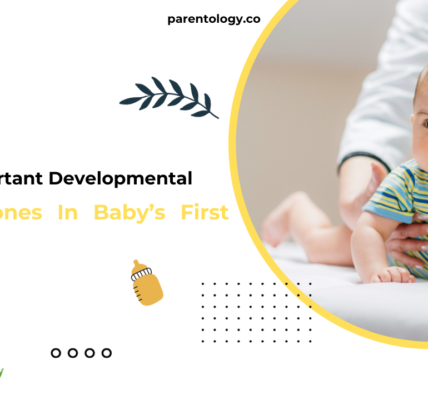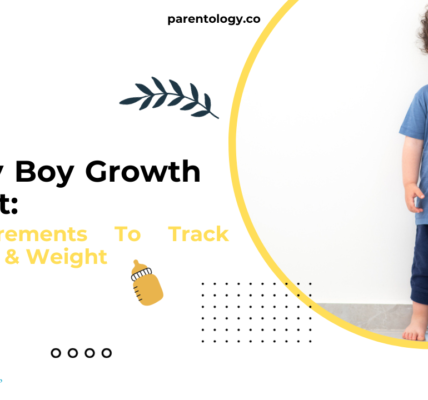Unveiling the Wonders of Baby Development Month By Month
Parenthood embarks on an enchanting journey that witnesses remarkable transformations in a baby’s growth and development. Understanding these month by month infant milestones helps parents cherish every moment and nurture their baby’s potential. Here’s a comprehensive guide on the significant milestones and developmental stages parents can expect month by month.
Month 1: The Newborn Wonder
The first month is a period of adaptation for newborns. They’re adjusting to life outside the womb, exploring their surroundings through sensory experiences. Babies can respond to stimuli, recognize voices, and begin developing sleep patterns. They often show reflexes like grasping and rooting, indicating their natural instincts. Communication is primarily through crying, their way of expressing needs.
Month 3: Embracing Smiles and Coos
By the third month, babies start to smile responsively, a delightful way of interacting with caregivers. They produce charming cooing sounds and demonstrate increased head control. Their vision and focus improve, allowing them to track moving objects and faces. They begin to enjoy simple interactions and might turn towards familiar voices or sounds.
Month 6: Exploring New Horizons
At six months, babies achieve significant milestones such as sitting up independently and reaching for objects using newfound hand-eye coordination. They might start babbling, experimenting with various sounds and expressions. Introduction to solid foods often begins around this stage, complementing their nutritional needs.


Month 9: The Advent of Mobility
Ninth-month milestones include the onset of crawling, pulling themselves up, and exploring the world with their mobility. They may develop pincer grasp, allowing them to pick up small objects. Their curiosity peaks, leading to exploration and increased interaction with their surroundings.
Month 12: First Steps into Independence
By their first birthday, some babies might take their first steps, marking a significant milestone in their motor development. They show preferences, display simple gestures, and might attempt to communicate through babbling or a few words. They enjoy simple games like peek-a-boo and imitate actions or sounds.
Month 18: Language and Cognitive Leaps
At eighteen months, toddlers experience a language burst, trying to imitate words and understanding simple instructions. Their cognitive abilities expand as they explore problem-solving activities like stacking blocks or fitting shapes into corresponding slots. They engage in parallel play and might show early signs of independence.
Month 24: Growing Independence
The second birthday marks a phase of growing independence. Toddlers exhibit increased vocabulary, articulate simple sentences, and display preferences for specific toys or activities. They show greater curiosity, engaging in pretend play and exploring their environment more actively. Their emotional expressions become more pronounced, showing empathy and understanding simple emotions.
Understanding the Developmental Factors
Nutrition:
- Breastfeeding or Formula: Proper feeding is crucial for a baby’s growth and brain development in the initial months.
- Introduction of Solids: As babies grow, introducing varied solids helps in providing essential nutrients.
Sleep Patterns:
- Establishing a Routine: Developing a consistent sleep routine contributes to a baby’s overall well-being and growth.
- Sleep Regression: Periods of sleep regression might occur due to developmental leaps or changes in routine.
Physical and Motor Skills:
- Tummy Time: This aids in developing neck muscles and prepares babies for rolling over and crawling.
- Fine Motor Skills: Activities like grasping objects or transferring them between hands signify fine motor skill development.
Factors Influencing Each Month by Month Infant Milestones
Premature Birth:
- Adjusted Age: Premature babies might reach milestones later, but their “adjusted age” should be considered in tracking development.
Individual Differences:
- Variations in Timelines: Babies develop at their own pace, and slight variations in hitting milestones are common.
Environmental Factors:
- Stimulating Environment: Providing a stimulating environment encourages exploration and supports development.


The Role of Interaction and Play
Bonding and Communication:
- Responsive Care: Responsive interactions foster secure attachment, essential for emotional development.
- Language Stimulation: Talking, reading, and singing to babies enhance language skills.
Play and Exploration:
- Sensory Play: Engaging in sensory activities stimulates a baby’s senses, aiding in cognitive development.
- Exploration Through Play: Safe exploration through toys and objects helps babies understand their surroundings.
Recognizing Red Flags and Seeking Support
Signs of Developmental Concerns:
- Delayed Milestones: Consistent delays or regressions in milestones might indicate developmental concerns.
- Lack of Progress: Persistent lack of progress in various areas might warrant professional evaluation.
Seeking Professional Advice:
- Pediatric Consultation: Consulting pediatricians or specialists provides valuable insights and early interventions if necessary.
- Early Intervention Programs: These programs support babies with developmental delays through therapies and support services.
Embracing Emotional Development
Building Emotional Bonds:
- Attachment Theory: Forming secure attachments through responsive care fosters emotional stability.
- Recognizing Emotions: Babies begin recognizing emotions, laying the foundation for social interaction.
Temperament and Personality:
- Unique Traits: Each baby exhibits a distinct temperament, shaping their personality.
- Understanding Differences: Acknowledging and adapting to a baby’s temperament aids in parenting approaches.
Supporting Cognitive Growth
Cognitive Milestones:
- Object Permanence: Around 8-9 months, babies start understanding that objects exist even when out of sight.
- Problem-Solving Skills: Encouraging exploration and simple problem-solving activities fosters cognitive abilities.
Importance of Stimulation:
- Visual Stimulation: Providing contrasting colors and patterns aids visual development.
- Auditory Stimulation: Engaging babies with sounds and music enhances auditory processing.
Integrating Social Development
Social Interaction:
- Peer Interaction: Babies observe and learn from interactions with caregivers and other babies.
- Imitation and Social Play: Imitating actions and engaging in social play promote social skills.
Understanding Social Cues:
- Responding to Emotions: Babies gradually learn to respond to emotions expressed by others.
- Sharing and Turn-Taking: Encouraging sharing and turn-taking in simple activities lays the foundation for social skills.


Monitoring Developmental Progress
Utilizing Developmental Checklists:
- Monitoring Milestones: Using milestone checklists helps in tracking a baby’s progress.
- Consultation with Experts: Discussing any concerns with pediatricians or early childhood specialists is beneficial.
Parental Observations:
- Observing Progress: Parents are key observers in tracking their baby’s development on a day-to-day basis.
- Seeking Guidance: Promptly seeking guidance for any concerns aids in timely interventions.
Celebrating Each Month by Month Infant Milestones
Cherishing Moments:
- Creating Memories: Documenting milestones through photos or journals preserves precious memories.
- Celebrating Achievements: Celebrating every milestone, no matter how small, boosts a baby’s confidence.
Enjoying the Journey:
- Mindful Parenting: Embracing the journey of baby development fosters a positive and nurturing environment.
- Appreciating Progress: Each milestone reached signifies growth and progress in a baby’s life.
The Role of Physical Development on Month by Month Infant Milestones
Gross Motor Skills:
- Crawling and Walking: Gradual progression from crawling to taking first independent steps signifies the development of gross motor skills.
- Outdoor Play: Encouraging exploration and outdoor activities supports physical development.
Fine Motor Skills:
- Hand-eye Coordination: Grasping small objects, stacking blocks, and scribbling aids in refining fine motor skills.
- Pincer Grasp: The ability to pick up small objects using the thumb and index finger develops around 9-12 months.
Sensory Development and Exploration
Sensory Stimulation:
- Tactile Sensation: Providing varied textures and tactile experiences enhances sensory development.
- Sensory Play: Engaging in activities involving different senses stimulates brain development.
Exploring the Environment:
- Curiosity and Exploration: Allowing babies to explore their surroundings safely fosters curiosity and cognitive growth.
- Nature and Sensory Exposure: Nature walks or outdoor experiences offer diverse sensory stimuli.
Sleep and Growth
Sleep Patterns and Development:
- Quality Sleep: Adequate sleep contributes to brain development, memory consolidation, and overall growth.
- Sleep Cycles: Understanding sleep cycles helps in establishing healthy sleep routines.
Growth and Nutrition:
- Healthy Diet: Proper nutrition is essential for physical and cognitive growth during infancy.
- Feeding Patterns: Gradually transitioning from breast milk or formula to solids supports nutritional needs.
Parental Engagement and Support
Bonding Through Play:
- Playful Interaction: Engaging in interactive play strengthens the bond between parents and babies.
- Parent-Baby Activities: Participating in activities together promotes a sense of security and trust.
Recognizing Signs of Development:
- Monitoring Progress: Recognizing developmental cues and milestones aids in understanding a baby’s growth.
- Seeking Guidance: Consulting healthcare professionals for guidance ensures a holistic approach to development.
Embracing Individual Growth Trajectories
Acknowledging Differences:
- Unique Timelines: Each baby follows their own developmental timeline; variations are common.
- Early Intervention: Addressing concerns early enables effective intervention strategies.
FAQs – Key Insights into Month by Month Infant Milestones
- What are the signs of a developmental delay in infants?
- Look for delays in reaching milestones or extreme variations from the typical growth patterns.
- How can parents support their baby’s development at home?
- Encourage interaction, play, reading, and provide a safe environment for exploration.
- When should parents be concerned about a baby’s development?
- Seek professional advice if there’s a lack of progress in milestones or if there are concerns about vision, hearing, or movement.
- Are there specific activities to enhance baby development?
- Engage in tummy time, offer sensory experiences, and introduce age-appropriate toys and games.
- What role does nutrition play in a baby’s developmental milestones?
- Proper nutrition contributes significantly to brain development and overall growth.
- How can parents track their baby’s milestones accurately?
- Use milestone checklists, observe regularly, and consult with pediatricians to track developmental progress.
- What should parents do if they notice regressions in their baby’s milestones?
- Consult healthcare providers to investigate possible causes and seek appropriate guidance.
Conclusion: Nurturing the Journey of Month by Month Infant Milestones
The journey of baby development is a unique and incredible process, with each milestone signaling progress in various domains. By understanding the diverse factors influencing development, parents can actively participate in fostering a nurturing environment for their child’s growth.
Remember, every baby is exceptional, and each month by month infant milestones should be seen as a guide rather than strict deadlines. Embracing each milestone, providing loving support, and seeking guidance when needed are key elements in nurturing a baby’s development.
For further insights on parenting and child development, explore Parentology, where a wealth of resources awaits to guide you through this enchanting journey.
Infographics





